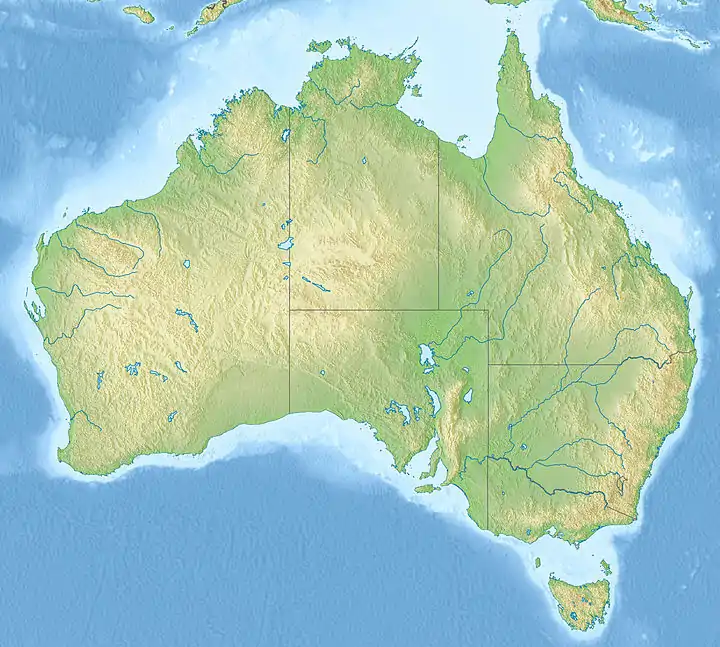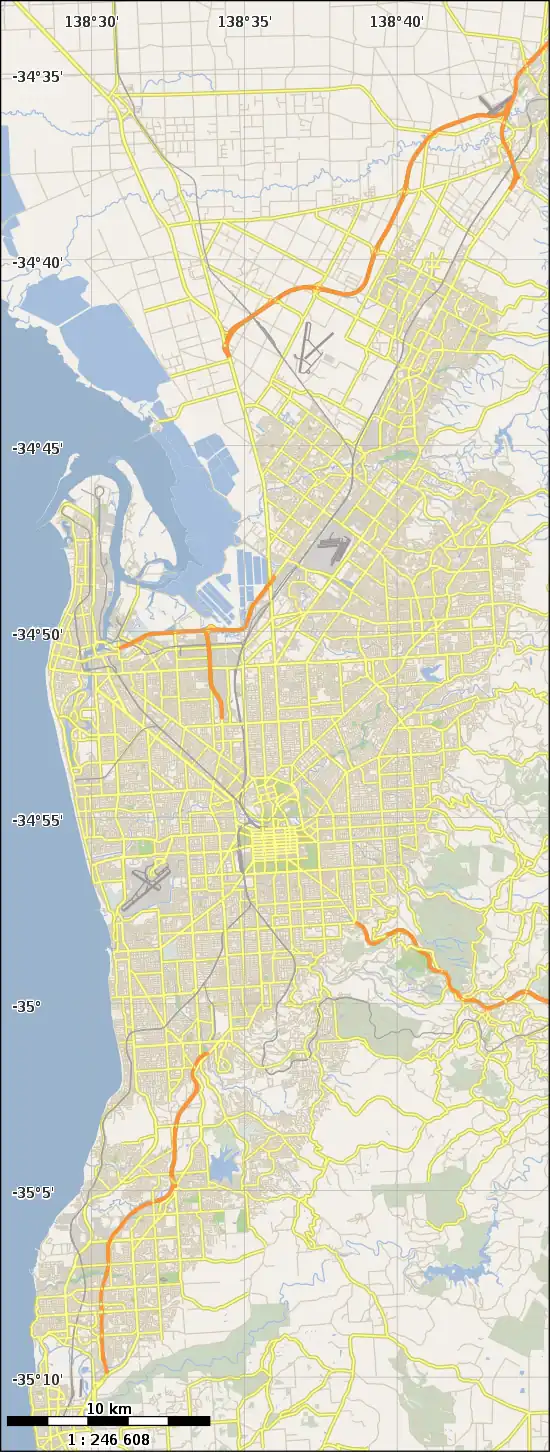| Osborne Naval Shipyard | |
|---|---|
 View of shipyard from the Port River | |
 Location of Osborne Naval Shipyard  Osborne Naval Shipyard (South Australia)  Osborne Naval Shipyard (Greater Adelaide) | |
| Location | Osborne, Adelaide |
| Coordinates | 34°47′06″S 138°30′40″E / 34.785°S 138.511°E |
| Industry | shipbuilding |
| Products | Royal Australian Navy ships |
| Owner(s) | Australian Naval Infrastructure (ANI)[1] |
The Osborne Naval Shipyard is a multi-user facility at Osborne on the Lefevre Peninsula in South Australia. It was established in 1987 for the Australian Submarine Corporation, and the first products of the facility were the six Collins-Class submarines.
Facilities
The ship building precinct includes a number of discrete facilities, as it has grown over the time it has existed.
The Government of South Australia built a "common user facility" that includes a wharf and Shiplift constructed between 2007 and 2010, known as Techport Australia. It was designed by Aurecon and constructed by McConnell Dowell and Built Environs.[2] Techport was sold by the state government to the Federal Government in 2017 for A$230 million.[3]
The shiplift was supplied by Rolls-Royce and is 156 metres (512 ft) long and 34 metres (112 ft) wide. It can lift 9,300 tonnes (9,200 long tons; 10,300 short tons) from a water depth of 18 metres (59 ft). It is designed to allow for future expansion to 210 metres (690 ft) length and lifting capacity of 20,000 tonnes (20,000 long tons; 22,000 short tons).[2]
Between 2017 and 2020, an extension was built behind Osborne South to construct the Hunter-class frigates. The largest building in the new complex is known as Building 22, and is 80 metres (260 ft) high with a footprint of 170 by 50 metres (560 ft × 160 ft), large enough for assembly of two frigates other than the upper superstructure.[4]
In September 2021, the Morrison government scrapped the French multi-billion dollar deal to build the Attack-class submarines.[5] Instead signing a monumental agreement with the United Kingdom and the United States to build 8 SSN-AUKUS submarines at the Osborne Naval Shipyard Adelaide for the Royal Australian Navy. The first submarine is expected in the early 2030s.
November 2023 the Australian government performed a land swap with the state government, trading land on three nearby military sites for 60 acres of land around Osborne Naval Shipyard for the construction of the nuclear submarine shipyard facilities and a workforce skills training centre, the federal government expect spades in the ground for the construction of site access roads and utilities diversions before the end of 2023.[6]
Tenants
Products
The list of ships constructed at the Osborne facility include:
- 6 Collins-Class submarines
- 3 Hobart-class Air Warfare Destroyers
- 2 Arafura-class offshore patrol vessels (construction commenced November 2018)[7]
- 9 Hunter-class frigates (to commence in 2020 with first delivery in 2027)
- 5 SSN-AUKUS submarines (the first is proposed in the early 2040s)
References
- ↑ "Australian Naval Infrastructure Pty Ltd Annual Report 2018-19, ANI's Assets". Transparency Portal. Australian Government. Retrieved 9 February 2020.
- 1 2 "Techport Australia's Common User Facility (CUF), Adelaide". Ship Technology. Retrieved 7 January 2019.
- ↑ Shepherd, Tory (12 May 2017). "The Federal Government has bought Techport from State Government for $230 million". The Advertiser. Retrieved 7 January 2019.
- ↑ Willis, Belinda (21 May 2020). "Frigate build site ready to launch $35 billion naval project". The Lead South Australia. Adelaide: Solstice Media. Retrieved 23 May 2020.
- ↑ Keane, Daniel (13 December 2018). "Future submarines renamed 'Attack class' but concerns remain about project rollout". ABC News. Retrieved 7 January 2019.
- ↑ https://www.abc.net.au/news/2023-11-10/sa-and-australian-governments-sign-land-swap-deal-aukus/103089870
- ↑ Zerbe, Ryan (15 November 2018). "Construction begins on Arafura Class patrol vessels". Navy Daily. Royal Australian Navy. Retrieved 15 November 2018.